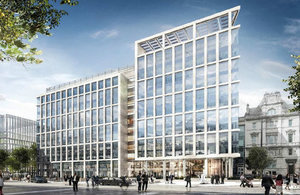UK Government’s flagship new Wales home named after literary pioneer
New UK Government Cardiff hub named Tŷ William Morgan - William Morgan House to recognise role in the development of modern-day Welsh

Cardiff UK Government hub named Tŷ William Morgan - William Morgan House
- Name chosen to reflect UK Government’s commitment to Wales and Welsh culture
- Building has capacity to host full UK Cabinet meetings
The UK Government’s Cardiff Central Square Hub building will be named after Bishop William Morgan in recognition of his pivotal role in maintaining the strength of the Welsh language, Welsh Secretary Alun Cairns has announced today, Thursday 31 October.
William Morgan spent nearly a decade translating the Bible into Welsh from Greek and Hebrew. His hugely significant work, which was completed in 1588, is seen as the foundation stone on which modern Welsh language literature is based.
The name of the new building was chosen to reflect the creativity and dedication of civil servants in Wales and the UK Government’s commitment to Wales and to Welsh culture.
More than 4,000 staff from various UK Government departments and agencies are set to work from the 12-storey hub, which will have capacity to host full UK Cabinet meetings. The first occupants are scheduled to move in in twelve months’ time.
Tŷ William Morgan / William Morgan House is one of 16 UK Government hub buildings currently being created across the UK’s nations and regions as part of the Government Estate Strategy.
Staff at the Cardiff hub will benefit from a flexible, inclusive working environment as well as close access to Cardiff Central railway station and other transport links.
Secretary of State for Wales Alun Cairns said:
Tŷ William Morgan - William Morgan House is central to the UK Government’s ambitious plans to create a dynamic civil service which is equipped to meet future demands.
The new building demonstrates the UK Government’s commitment to Wales and to strengthening the Union. It will provide a modern working environment to attract and retain high calibre staff who will be able to grow their careers locally.
It is fitting that this landmark building in our capital city is named after a figure whose pioneering translation of the Bible was instrumental in the survival and growth of the Welsh language and in the development of our unique culture.